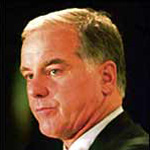By John Briggs
Published May 15th 2009 in Burlington Free Press
State law trumps Burlington's city charter, City Attorney Ken Schatz has determined, and that means a referendum on the instant-runoff method of electing Burlington's mayor must be presented on the ballot at the annual March election rather than in a special election.
Schatz's opinion was delivered to the City Council in response to a question from Clarence Davis, P-Ward 3.
A local group, "One Person, One Vote," circulated a petition for about a month that calls for a special election to undo the instant-runoff voting, or IRV, method used in Burlington mayoral elections in 2006 and 2009.
Voters in 2005 approved a charter change authorizing the IRV method, and that change was subsequently approved by the Legislature. IRV allows voters to rank mayoral candidates and, in effect, cast their vote in a subsequent voting round for their favorite remaining candidate.
This year, the Green Party and independent candidates were eliminated after the first IRV tabulation as it was mathematically impossible for them to reach the 50 percent plus one required of the winning candidate. Their supporters' second-choice vote was then distributed to the remaining candidates.
After another IRV round, Democrat Andy Montroll was eliminated, and his supporters' second-choice votes were distributed to Republican Kurt Wright and Progressive Bob Kiss.
Wright had the highest vote totals in the first two rounds, but Kiss ultimately won with 52 percent of the vote, because Montroll's supporters generally preferred Kiss rather than Wright as their second choice.
The petition would return to the pre-IRV system that applies to council and school board races and the mayoral election. It would mandate a runoff election between the top two candidates if no candidate earned at least 40 percent of the vote.
Paul Decelles, R-Ward 7, a member of the petition group, said about 900 of 1,650 required signatures have been collected. The One Person, One Vote group hasn't met since Schatz delivered his opinion and will set up a table from 9 a.m. to 2 p.m. Saturday at the Ethan Allen Shopping Center to collect additional signatures.
Decelles said petition supporters had a number of reasons for wanting to eliminate IRV. While he personally had opposed the change in 2005, he said, the rationale for the petition is that Burlington voters have seen IRV in operation twice and deserved an opportunity to say whether they still like the system.
The issue for Schatz was the conflict between city and state rules. The city charter authorizes a special election in response to a petition signed by 5 percent of the legal voters, but state law limits charter change questions, Schatz said, "to the next annual meeting, primary or general election."
In this case, he noted, the annual meeting is the next scheduled election. Schatz said in his memo that the state statute trumps the charter because it is more specific, in that it deals "explicitly" with changes to the charter, while the city charter provision "is addressed more generally to special meetings for any legal purpose beyond the jurisdiction of the City Council."
Schatz noted that his reading of the law could be contested in Superior Court.
Democrat Sandy Baird, a member of the anti-IRV group, said an independent attorney is examining Schatz's interpretation of the competing statutes.
Schatz's opinion was delivered to the City Council in response to a question from Clarence Davis, P-Ward 3.
A local group, "One Person, One Vote," circulated a petition for about a month that calls for a special election to undo the instant-runoff voting, or IRV, method used in Burlington mayoral elections in 2006 and 2009.
Voters in 2005 approved a charter change authorizing the IRV method, and that change was subsequently approved by the Legislature. IRV allows voters to rank mayoral candidates and, in effect, cast their vote in a subsequent voting round for their favorite remaining candidate.
This year, the Green Party and independent candidates were eliminated after the first IRV tabulation as it was mathematically impossible for them to reach the 50 percent plus one required of the winning candidate. Their supporters' second-choice vote was then distributed to the remaining candidates.
After another IRV round, Democrat Andy Montroll was eliminated, and his supporters' second-choice votes were distributed to Republican Kurt Wright and Progressive Bob Kiss.
Wright had the highest vote totals in the first two rounds, but Kiss ultimately won with 52 percent of the vote, because Montroll's supporters generally preferred Kiss rather than Wright as their second choice.
The petition would return to the pre-IRV system that applies to council and school board races and the mayoral election. It would mandate a runoff election between the top two candidates if no candidate earned at least 40 percent of the vote.
Paul Decelles, R-Ward 7, a member of the petition group, said about 900 of 1,650 required signatures have been collected. The One Person, One Vote group hasn't met since Schatz delivered his opinion and will set up a table from 9 a.m. to 2 p.m. Saturday at the Ethan Allen Shopping Center to collect additional signatures.
Decelles said petition supporters had a number of reasons for wanting to eliminate IRV. While he personally had opposed the change in 2005, he said, the rationale for the petition is that Burlington voters have seen IRV in operation twice and deserved an opportunity to say whether they still like the system.
The issue for Schatz was the conflict between city and state rules. The city charter authorizes a special election in response to a petition signed by 5 percent of the legal voters, but state law limits charter change questions, Schatz said, "to the next annual meeting, primary or general election."
In this case, he noted, the annual meeting is the next scheduled election. Schatz said in his memo that the state statute trumps the charter because it is more specific, in that it deals "explicitly" with changes to the charter, while the city charter provision "is addressed more generally to special meetings for any legal purpose beyond the jurisdiction of the City Council."
Schatz noted that his reading of the law could be contested in Superior Court.
Democrat Sandy Baird, a member of the anti-IRV group, said an independent attorney is examining Schatz's interpretation of the competing statutes.
 On March 16th, Former Vermont Governor and Democratic National Committee Chair Howard Dean continued his support for instant runoff voting on Vermont Radio's Mark Johnson Show. Commenting on Burlington's recent IRV election, Dean said "I think the best and most democratic way to use to elect people in multiparty elections is instant runoff voting." Dean also supported the system when it was first used in Burlington in 2006.
On March 16th, Former Vermont Governor and Democratic National Committee Chair Howard Dean continued his support for instant runoff voting on Vermont Radio's Mark Johnson Show. Commenting on Burlington's recent IRV election, Dean said "I think the best and most democratic way to use to elect people in multiparty elections is instant runoff voting." Dean also supported the system when it was first used in Burlington in 2006. Citizens of Burlington, Vermont went to the polls on Tuesday, March 3rd to vote for the second time in an election using instant runoff voting. At 8:25 PM, the city declared that incumbent Mayor Bob Kiss had won reelection in the third and final round of counting, narrowly edging out challenger Kurt Wright, 51.5% to 48.5%. The race was unique in that it had four candidates that had a legitimate shot at winning: Progressive Kiss, Republican Wright, Democrat Andy Montroll, and independent Dan Smith. In most other American cities, there would be fear of "spoiler" candidates, but IRV allowed all four candidates to run without having to worry about being labeled "spoilers."
Citizens of Burlington, Vermont went to the polls on Tuesday, March 3rd to vote for the second time in an election using instant runoff voting. At 8:25 PM, the city declared that incumbent Mayor Bob Kiss had won reelection in the third and final round of counting, narrowly edging out challenger Kurt Wright, 51.5% to 48.5%. The race was unique in that it had four candidates that had a legitimate shot at winning: Progressive Kiss, Republican Wright, Democrat Andy Montroll, and independent Dan Smith. In most other American cities, there would be fear of "spoiler" candidates, but IRV allowed all four candidates to run without having to worry about being labeled "spoilers." On April 4, Vermont governor Jim Douglas chose to veto legislation to re-establish majority elections for Congress in his state through instant runoff voting. Vermont would have been the first state to enact IRV for Congress; legislative leaders affirmed their commitment to the bill, and it is sure to move in the state again. FairVote has worked hard to support this legislation, which likely generated more than 600 phone calls to the governor from Vermonters.
On April 4, Vermont governor Jim Douglas chose to veto legislation to re-establish majority elections for Congress in his state through instant runoff voting. Vermont would have been the first state to enact IRV for Congress; legislative leaders affirmed their commitment to the bill, and it is sure to move in the state again. FairVote has worked hard to support this legislation, which likely generated more than 600 phone calls to the governor from Vermonters.